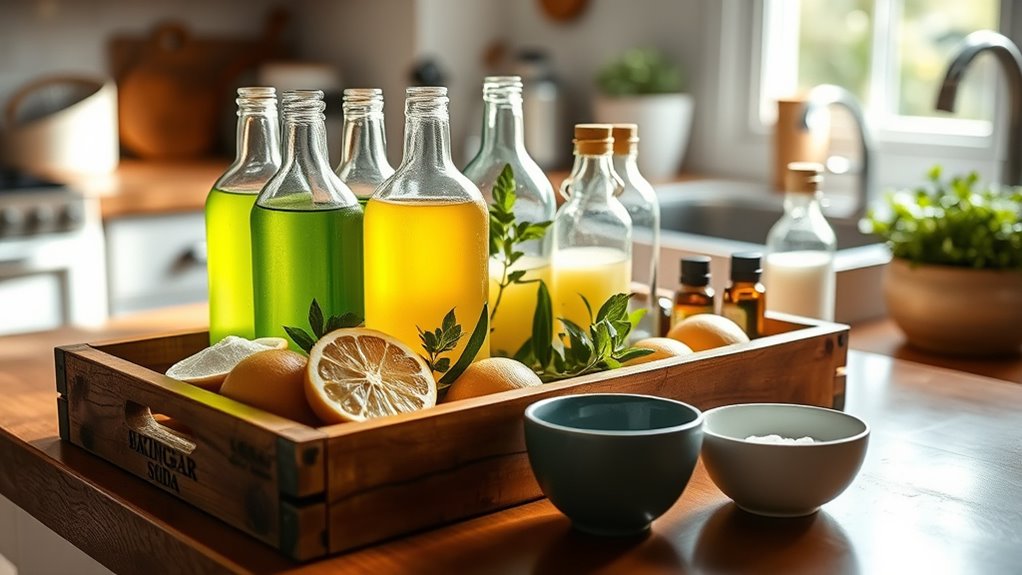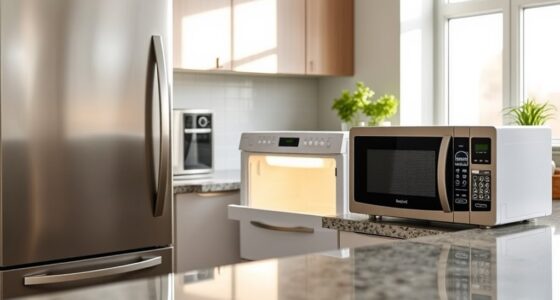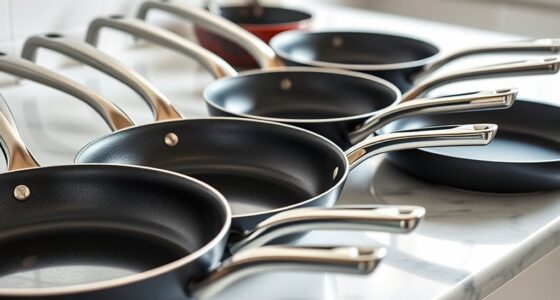To make your own eco-friendly cleaning products at home, gather natural ingredients like vinegar, baking soda, castile soap, and essential oils. Combine these in reusable containers, using simple recipes for tasks like all-purpose cleaner, sink scrub, or laundry detergent. Handle ingredients safely and store solutions properly to prevent accidents. Keep your routine toxin-free by choosing ingredients carefully and practicing sustainable methods. If you keep exploring, you’ll discover even more effective, eco-conscious cleaning tips to try.
Key Takeaways
- Gather common natural ingredients like vinegar, baking soda, castile soap, and lemon juice for versatile cleaning solutions.
- Use essential oils such as tea tree, lavender, or lemon to boost cleaning power and freshen scents safely.
- Follow simple recipes combining these ingredients to create all-purpose cleaners, scrubs, and degreasers.
- Store homemade cleaners in labeled, airtight glass containers and keep them out of reach of children and pets.
- Regularly maintain your routine by using natural ingredients, avoiding harmful chemicals, and practicing sustainable cleaning habits.
Gathering Natural Ingredients and Supplies
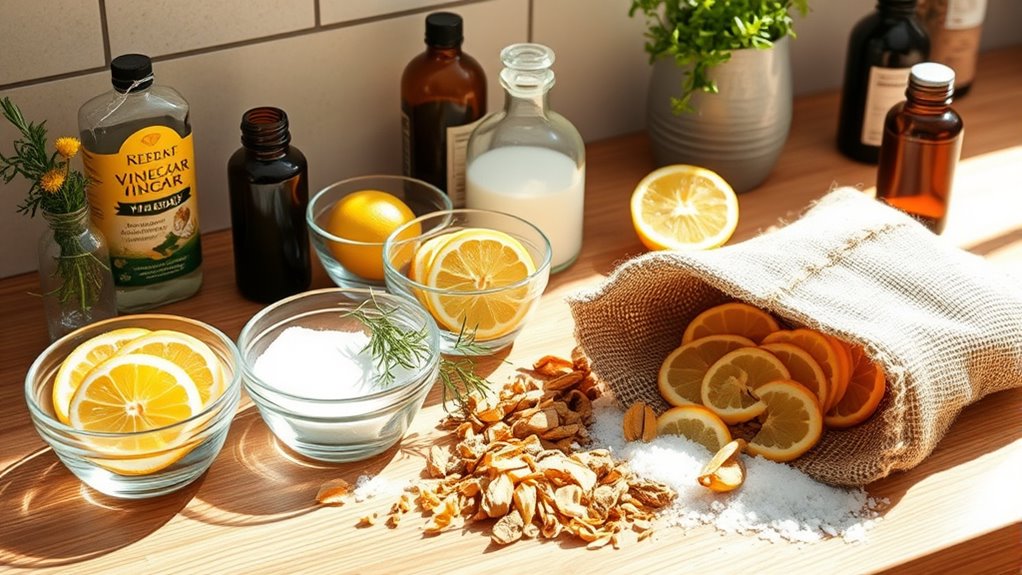
To make effective eco-friendly cleaning products at home, start by gathering natural ingredients and supplies that are easily accessible. Stock up on common items like vinegar, baking soda, castile soap, and lemon juice, which form the base of many homemade cleaners. Essential oils such as tea tree, lavender, or lemon boost cleaning power and add pleasant scents, but remember to dilute them properly. Use reusable containers like glass spray bottles and jars to store your DIY solutions safely and sustainably. Invest in basic cleaning supplies like microfiber cloths, sponges, and scrub brushes, which are reusable and reduce waste. Always wear safety gear like gloves and masks when handling concentrated ingredients like borax and washing soda to protect your skin and respiratory health. Incorporating natural ingredients not only ensures your cleaners are eco-friendly but also enhances their effectiveness and safety. Understanding the chemical properties of these ingredients helps you create more efficient and safe cleaning solutions, and being aware of potential toxicity is crucial for safe handling. Additionally, familiarizing yourself with AI-driven safety tips can help optimize your cleaning process and prevent accidents. Being mindful of environmental impact ensures your cleaning practices contribute positively to sustainability and ecological health.
Understanding the Types of Eco-Friendly Cleaners

Understanding the different types of eco-friendly cleaners helps you choose the right solution for each household task. Alkali cleaners, like baking soda, borax, and washing soda, break down grease, dirt, and grime through chemical reactions. Acid cleaners, such as vinegar and lemon juice, dissolve mineral deposits, rust, and hard water stains by neutralizing alkaline residues. Natural detergents like castile soap and plant-based cleaners effectively lift dirt and grease without harmful chemicals. Abrasives, including baking soda and salt, gently scrub away stains and dirt through physical abrasion, offering a safe alternative to harsh scouring powders. Recognizing these categories ensures you select the most effective, eco-friendly cleaning method for each surface, helping you maintain a safe, chemical-free home environment while reducing your ecological footprint. Additionally, incorporating sound healing principles can promote a peaceful atmosphere during cleaning routines, enhancing overall well-being. Being aware of environmental impact when choosing cleaning ingredients can further support your efforts to create a sustainable home. Incorporating biodegradable ingredients ensures that your cleaning practices do not contribute to long-term pollution or harm aquatic ecosystems. Moreover, selecting dog-friendly cleaners can help keep your pets safe from harmful residues during cleaning. To ensure your eco-friendly cleaning regimen aligns with sustainability goals, consider using products made from renewable resources whenever possible.
Simple Recipes for Common Household Cleaning Tasks
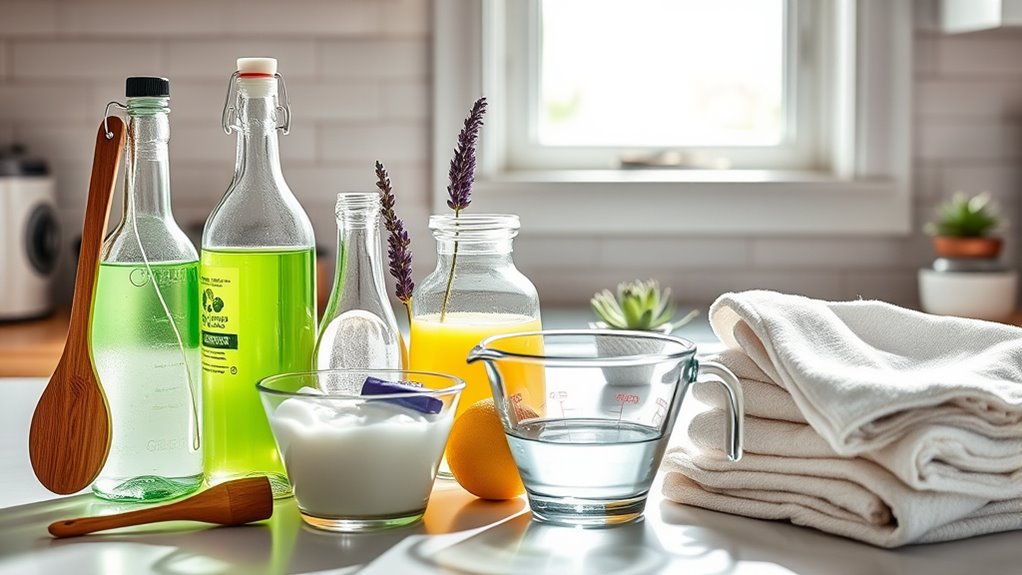
Once you’ve identified the types of eco-friendly cleaners that suit your needs, creating simple homemade solutions for everyday chores becomes straightforward. For all-purpose cleaning, mix 2 cups of white vinegar with 2 cups of water and add 20-30 drops of essential oils for a fresh scent. To scrub sinks and stovetops, combine 2 cups of baking soda with castile soap and a few drops of essential oils to make a creamy paste. For laundry, blend soap flakes, washing soda, and baking soda to create a natural detergent. Use lemon juice, white vinegar, and olive oil for a natural furniture polish. For drains and stains, sprinkle baking soda, then pour vinegar, letting it sit before rinsing. Incorporating environmentally friendly cleaning methods helps reduce chemical exposure and promotes a healthier home environment. Using natural cleaning ingredients like vinegar and baking soda not only enhances safety but also aligns with eco-conscious living.
Safe Handling and Storage of Homemade Cleaners
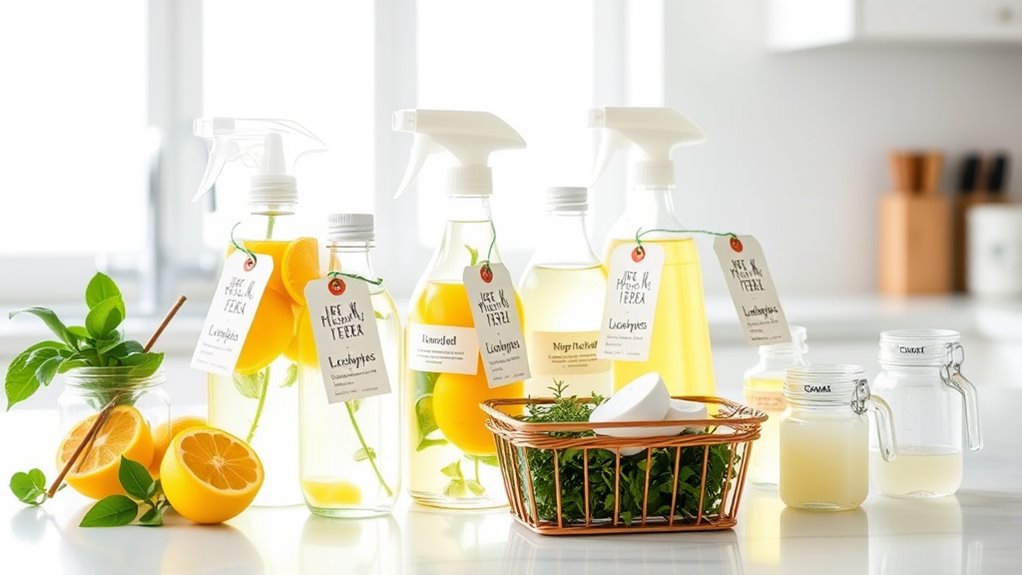
Handling and storing homemade cleaners safely is essential to prevent accidents and maintain their effectiveness. Always use clearly labeled, airtight containers to store your solutions, keeping them out of reach of children and pets for child safety. When handling concentrated or caustic ingredients like washing soda or borax, wear protective gloves to avoid skin irritation. Store ingredients separately and avoid mixing solutions unless specified in a recipe, preventing dangerous reactions. Keep your cleaners in cool, dry, dark places to protect ingredient preservation and prevent degradation. Regularly inspect containers for leaks or damage; properly dispose of any unused or expired solutions following local hazardous waste guidelines. Proper storage and handling are key to safe, effective homemade cleaning products. As automation advances across industries, understanding data privacy challenges is crucial to protect your information while managing homemade products safely. Implementing safe handling procedures can further reduce the risk of accidents and ensure your cleaning solutions remain effective over time.
Tips for Maintaining a Toxin-Free Cleaning Routine
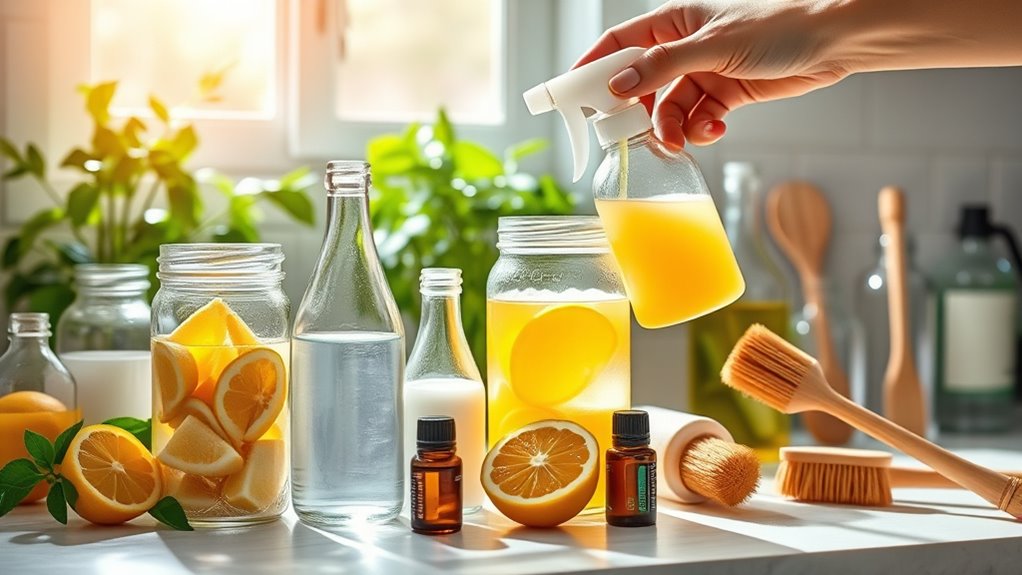
Maintaining a toxin-free cleaning routine starts with choosing natural ingredients like vinegar, baking soda, and castile soap, which effectively clean without introducing harmful chemicals into your home. Always read labels and opt for products with minimal, recognizable ingredients to keep your routine truly toxin-free. Incorporate essential oils such as tea tree, lemon, or lavender into your homemade cleaners for their antimicrobial properties and pleasant scents, avoiding synthetic fragrances. Store your cleaning solutions in reusable glass containers, clearly labeled, and never mix different chemicals to prevent dangerous reactions. Regularly ventilate your home during and after cleaning to disperse residual fumes and improve indoor air quality. Using freeze-drying techniques for storage can help preserve the potency of natural ingredients and extend their shelf life. Implementing sustainable practices like zero-waste cleaning can further reduce your environmental impact and promote a healthier home environment. Additionally, understanding proper bicycle tire storage and maintenance techniques can prevent damage and prolong the lifespan of your equipment. By focusing on natural ingredients and sustainable cleaning practices, you reduce environmental impact and ensure a safer, healthier living space.
Frequently Asked Questions
How Can I Make My Own Eco-Friendly Cleaning Products?
To make your own eco-friendly cleaning products, start by combining kitchen staples like vinegar, baking soda, and castile soap to create versatile solutions. Add essential oils such as lemon or tea tree for extra disinfectant power and a pleasant scent. Use reusable spray bottles and adjust ingredient ratios for different tasks. Always store your cleaners safely in labeled containers out of reach of kids and pets for safety and effectiveness.
How Do I Create My Own Cleaning Products?
You’re about to reveal the secret to spotless cleaning! To create your own cleaning products, start by gathering simple ingredients like vinegar, baking soda, castile soap, and essential oils. Mix them in the right ratios with warm water for maximum power. Always label everything clearly, test on small areas first, and store in reusable, childproof containers. With these steps, you’ll make eco-friendly cleaners that outshine store-bought options!
How to Make Homemade Natural All-Purpose Cleaner?
To make your own natural all-purpose cleaner, mix 2 cups of distilled white vinegar with 2 cups of water in a spray bottle. Add 20-30 drops of essential oils like lemon or tea tree for a fresh scent and antibacterial boost. Warm the mixture slightly before shaking well. Spray on surfaces like countertops, glass, and tiles, letting it sit briefly before wiping with a microfiber cloth for a deep clean.
How to Make Non-Toxic House Cleaner?
You’re looking to make a non-toxic house cleaner, so start with a spray bottle filled with equal parts white vinegar and water. Add 10-15 drops of essential oils like lemon or tea tree for a fresh scent and extra disinfectant power. Use baking soda for stubborn stains and deodorizing. Store everything in reusable glass bottles, label them clearly, and avoid mixing incompatible ingredients to keep your cleaning safe and effective.
Conclusion
So, while you’re busy making your own eco-friendly cleaners, it’s amusing how simple ingredients can outshine store-bought toxins. You get to save the planet, your wallet, and maybe even your nose from harsh fumes—all in one go. Who knew that something so natural could be so effective? Now, enjoy your spotless home, knowing you’ve outsmarted harmful chemicals with just a few humble ingredients. Clean living never felt so satisfying—ironically, it’s easier than grabbing that synthetic spray.
